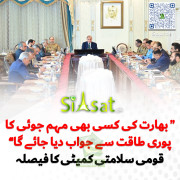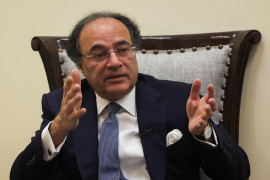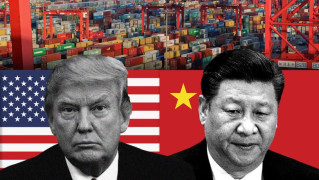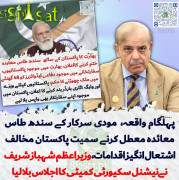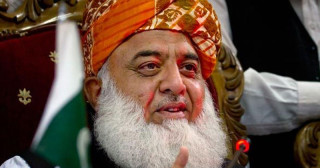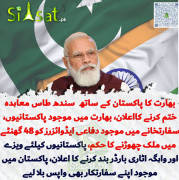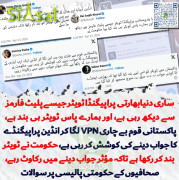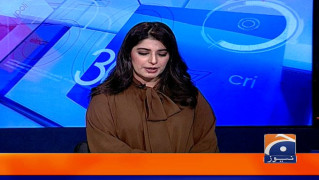You are using an out of date browser. It may not display this or other websites correctly.
You should upgrade or use an alternative browser.
You should upgrade or use an alternative browser.
Karachi, Hyderabad, Mirpurkhas Local Government news
- Thread starter bisaat
- Start date
bisaat
Banned
Plan to end illegal occupation of plots in making: Vohra
KARACHI - Deputy Mayor of Karachi Dr Arshad Vohra said on Thursday it was essential to remove the encroachments from different areas of the city and a plan was being prepared to end the illegal occupation on plots which had been allocated to facilitate them.
He said this in a meeting with a delegation comprising residents of Gulistan e jauhar.
The Deputy Mayor said land mafia had established encroachments on allotted and leased plots which should be removed to give possession of such plots to the original allottees.
He said Gulistan e jauhar was one such area where a good number of plots had been occupied by land mafia and the actual owners were seen deprived of their just rights.
The Deputy Mayor said people from middle class buy these plots with their whole life earning and some elements in our society deprive them with their right.
The delegation apprised him about their problems.
Deputy Mayor said encroachments from Gujjar and Manzoor Colony Nullah being removed and this campaign was underway in other areas of the city to clear the roads and pavements for citizens.
Meanwhile, Municipal Commissioner of KMC D.
Badar Jameel has directed all departmental heads to bring improvement in recovery condition and mobilize the field staff to make it better.
Giving these directives to the land department, MUCT, chard parking, culture, food and quality control department, medical and health services, estate and kutchi abadies department he said the concerned officials should launch raids and avoid irresponsible attitude.
He warned that the departmental head will have to face the action in case of failure in improving the recovery condition.
The Municipal Commissioner said the fiscal deficit of the organization being increased and therefore it was the duty of the officers to spend all their energy on improving the revenue generation and collection.
He said such a planning should be made which could ease the financial crunch and the organization be taken towards financial stability.
He instructed that while bringing improvement in the existing revenue resources also search for new resources of income.
On the other side, the anti encroachments staff of KMC while taking action surrounding the Haidery Market removed lot of encroachments from the main road and foot paths.
Police arrested 10 people for resisting the anti encroachments move in North Karachi.
Director anti encroachments department of KMC Mazhar Khan supervised the above operation along with other officers.
End
KARACHI - Deputy Mayor of Karachi Dr Arshad Vohra said on Thursday it was essential to remove the encroachments from different areas of the city and a plan was being prepared to end the illegal occupation on plots which had been allocated to facilitate them.
He said this in a meeting with a delegation comprising residents of Gulistan e jauhar.
The Deputy Mayor said land mafia had established encroachments on allotted and leased plots which should be removed to give possession of such plots to the original allottees.
He said Gulistan e jauhar was one such area where a good number of plots had been occupied by land mafia and the actual owners were seen deprived of their just rights.
The Deputy Mayor said people from middle class buy these plots with their whole life earning and some elements in our society deprive them with their right.
The delegation apprised him about their problems.
Deputy Mayor said encroachments from Gujjar and Manzoor Colony Nullah being removed and this campaign was underway in other areas of the city to clear the roads and pavements for citizens.
Meanwhile, Municipal Commissioner of KMC D.
Badar Jameel has directed all departmental heads to bring improvement in recovery condition and mobilize the field staff to make it better.
Giving these directives to the land department, MUCT, chard parking, culture, food and quality control department, medical and health services, estate and kutchi abadies department he said the concerned officials should launch raids and avoid irresponsible attitude.
He warned that the departmental head will have to face the action in case of failure in improving the recovery condition.
The Municipal Commissioner said the fiscal deficit of the organization being increased and therefore it was the duty of the officers to spend all their energy on improving the revenue generation and collection.
He said such a planning should be made which could ease the financial crunch and the organization be taken towards financial stability.
He instructed that while bringing improvement in the existing revenue resources also search for new resources of income.
On the other side, the anti encroachments staff of KMC while taking action surrounding the Haidery Market removed lot of encroachments from the main road and foot paths.
Police arrested 10 people for resisting the anti encroachments move in North Karachi.
Director anti encroachments department of KMC Mazhar Khan supervised the above operation along with other officers.
End
bisaat
Banned
Letter from Karachi
October 18, 2016
The city is not different from one in India, and the talk is always about shared heritage
Somehow I thought that if I ever went to Pakistan, I would perhaps cross the Wagah border and make my way to Lahore and then Gujranwala, where my four grandparents came from. It was an idealist vision, fuelled partly by another generation’s nostalgia, and my years of teaching colonialism, Partition, and all the rest. Instead, as it turned out, I landed at Jinnah International Airport in Karachi on an Emirates flight from Dubai.
I went there to give a keynote address on Delhi at a conference on megacities organised by my university in the U.S. and the University of Karachi. I was on the opening panel with a Brazilian and a Turk, who talked about Sao Paulo and Istanbul, respectively. The idea was to start by showcasing megacities around the world and then focus on the issues and problems of Karachi.
There hasn’t been a census taken in Karachi since 1998, and the Karachi doctoral students and faculty presented findings from their own recent surveys of over 11,000 residents in the city. The conference platform was that the city’s policies should be determined by data — empirical facts and figures about health, education, water, sanitation, transportation, and youth — and not by the politics of prejudice. The elephant in the room was urban governance, despite the appearance of Karachi’s Acting Mayor at a few sessions. I was surprised to learn that Karachi — a city of an estimated 24 million — does not really have its own city government but rather comes under the jurisdiction of the state of Sindh, a government more concerned, many told me, with its rural constituencies. Meanwhile, the power centre, Islamabad, is a two-hour flight away, in neighboring and politically dominant Punjab. This leaves Karachi’s management somewhat at sea, even though the city’s production represents well over half of the country’s wealth.
The conference was attended by over 300 people each day — mostly faculty and students from the University of Karachi, but also journalists, urban planners, and a few politicians. When my turn came to speak, I was conscious of the fact that Delhi was not only another world megacity but also a neighbor down the road. Even if Delhi may be more like Lahore (two heritage cities) and Mumbai more like Karachi (two colonial port cities), certainly Delhi had more in common with Karachi than most other places in the world. I felt this immediately when I got down at the airport and was met by my host, Mustafa, a 30-something Ph.D. student with an infectious smile. I spoke in Hindi and he in Urdu, and my academic knowledge about the Persianisation of Urdu and Sanskritisation of Hindi crumbled to bits. We were both speaking the same language, and it was Hindustani.
In my talk on Delhi, I spoke about transport challenges in the city, our own urban politics of inequality, and my ethnographic studies of the social impact of the Delhi Metro. I mentioned the ladies’ coach of the Metro and the continuing debates about whether there should be a separate space for women or not. I talked about the city’s erstwhile BRT and why it might have failed politically, even if it was a success to those bus riders who whizzed along its corridor. Karachi has little in the way of public transport (though its first BRT is to open soon); its buses, numbering only 2,000 for the entire city, were the most intricate and colorful I have ever seen, and yet so crammed men ride on top of them. One of the Karachi Ph.D. student researchers caused a stir by presenting data on the high incidence of sexual harassment on Karachi’s buses; on the one hand, her research was covered extensively in the press and she was later interviewed about it on Pakistani television; on the other, forces on the religious right called her a traitor for reporting news that could in no way be true.
People in Karachi spoke to me about about security issues, but I soon realised they were talking about petty crime, armed muggings and house break-ins, not terrorism. While I was there, I heard of someone’s friend who had been shot while having his iPhone stolen. I also learned that the wealthier segments of society often live on military cantonment land — the military is also a property dealer in the city, building housing stock and offering more secure neighborhoods. Meanwhile, 62 per cent of the population lives in KatchiAbadis, informal settlements in the city and increasingly in its hinterlands.
One night we were driven to the outskirts to a new private housing development, 45 minutes along a potholed highway with traffic going in multiple directions. It had picture-perfect lawns and playgrounds, a Pizza Hut, and imposing gates. We saw a model home with marble floors and choice amenities in a row of elegant attached homes, going for over a crore each. It was a contested site, likely built on archaeological ruins and with no public utilities, yet a few of the students I was with said they would be happy to live there. It was serene, uncluttered, and completely unconnected to the city.
Back in the conference hall, people wanted to know more about Delhi life, how people lived there, how similar or different it really was, and especially — perhaps because more than half the audience were young women — how easily women moved around in public space. The students did not have a single question or comment about India-Pakistan or Pakistan-India. In that conference hall, at least, we talked city-to-city, people to people, and spoke of many common social issues.
Relating through cities rather than nations began, I realized, when I first arrived on campus and was led into a Dean’s office for chai. With him were five of the city’s newspaper editors, all sitting around a coffee table. Our formal introductions quickly led to where I was from, and when they learned the specifics of that, they each went around saying they hailed from “Meerut, Allahabad, Lucknow …” — places they had never been to but which meant something to them.
The conference was not just a formal affair. There were teas and lunches and dinners and wanderings in the city. There were chats with drivers, servers, and guesthouse staff. It was impossible, in my mind, not to compare everything I saw with the Indian cities I knew — Delhi, Mumbai, and Chennai. One beach reminded me of Juhu in Mumbai, another of Elliot’s in Chennai. Jinnah’s portrait appeared where I was used to seeing Nehru’s.
On the first day, wearing a long kurta and churidar pajama, I realised I was the only woman in the conference hall in short sleeves halfway to my elbows — the rest all wore kurtas that went to their wrists, though only a third of the women in the hall had their hair covered, and few were wearing hijabs. When I asked one of the students if people would mind if I was in short sleeves, she responded cheerfully, “No, not at all, everything goes here, you’ll see women in short sleeves, too.” She was right in a way. On a Friday night in Dolman’s mall — as fancy as Delhi’s Saket mall and with many of the same shops but with a more vertical orientation and seaside location — girls and women wore jeans, slinky tops and all the rest. When the call for prayers happened in the mall, the women I was with discretely slid their dupattas over their heads for a few moments.
On the last day of the conference, I was part of another Q&A panel, and the Dean introduced me by saying I was not only Indian but from Gujranwala as well. I felt embarrassed by the attention, but this news brought cheers from the audience and added a different dimension to the warmth and incredible hospitality I had been shown all week. At the tea break, a junior faculty member I hadn’t met before came up to me to say he was also from Gujranwala. I explained to him that it was an abstract place for me, an association passed down but not experienced in any real way. He said it was a good place and that I should come there sometime; he also joked that we were probably related. We both laughed, took a selfie and went our separate ways.
RashmiSadanateaches at George Mason Universityand is the author of English Heart, Hindi Heartland: the Political Life of Literature in India;[email protected]
October 18, 2016
The city is not different from one in India, and the talk is always about shared heritage
Somehow I thought that if I ever went to Pakistan, I would perhaps cross the Wagah border and make my way to Lahore and then Gujranwala, where my four grandparents came from. It was an idealist vision, fuelled partly by another generation’s nostalgia, and my years of teaching colonialism, Partition, and all the rest. Instead, as it turned out, I landed at Jinnah International Airport in Karachi on an Emirates flight from Dubai.
I went there to give a keynote address on Delhi at a conference on megacities organised by my university in the U.S. and the University of Karachi. I was on the opening panel with a Brazilian and a Turk, who talked about Sao Paulo and Istanbul, respectively. The idea was to start by showcasing megacities around the world and then focus on the issues and problems of Karachi.
There hasn’t been a census taken in Karachi since 1998, and the Karachi doctoral students and faculty presented findings from their own recent surveys of over 11,000 residents in the city. The conference platform was that the city’s policies should be determined by data — empirical facts and figures about health, education, water, sanitation, transportation, and youth — and not by the politics of prejudice. The elephant in the room was urban governance, despite the appearance of Karachi’s Acting Mayor at a few sessions. I was surprised to learn that Karachi — a city of an estimated 24 million — does not really have its own city government but rather comes under the jurisdiction of the state of Sindh, a government more concerned, many told me, with its rural constituencies. Meanwhile, the power centre, Islamabad, is a two-hour flight away, in neighboring and politically dominant Punjab. This leaves Karachi’s management somewhat at sea, even though the city’s production represents well over half of the country’s wealth.
The conference was attended by over 300 people each day — mostly faculty and students from the University of Karachi, but also journalists, urban planners, and a few politicians. When my turn came to speak, I was conscious of the fact that Delhi was not only another world megacity but also a neighbor down the road. Even if Delhi may be more like Lahore (two heritage cities) and Mumbai more like Karachi (two colonial port cities), certainly Delhi had more in common with Karachi than most other places in the world. I felt this immediately when I got down at the airport and was met by my host, Mustafa, a 30-something Ph.D. student with an infectious smile. I spoke in Hindi and he in Urdu, and my academic knowledge about the Persianisation of Urdu and Sanskritisation of Hindi crumbled to bits. We were both speaking the same language, and it was Hindustani.
In my talk on Delhi, I spoke about transport challenges in the city, our own urban politics of inequality, and my ethnographic studies of the social impact of the Delhi Metro. I mentioned the ladies’ coach of the Metro and the continuing debates about whether there should be a separate space for women or not. I talked about the city’s erstwhile BRT and why it might have failed politically, even if it was a success to those bus riders who whizzed along its corridor. Karachi has little in the way of public transport (though its first BRT is to open soon); its buses, numbering only 2,000 for the entire city, were the most intricate and colorful I have ever seen, and yet so crammed men ride on top of them. One of the Karachi Ph.D. student researchers caused a stir by presenting data on the high incidence of sexual harassment on Karachi’s buses; on the one hand, her research was covered extensively in the press and she was later interviewed about it on Pakistani television; on the other, forces on the religious right called her a traitor for reporting news that could in no way be true.
People in Karachi spoke to me about about security issues, but I soon realised they were talking about petty crime, armed muggings and house break-ins, not terrorism. While I was there, I heard of someone’s friend who had been shot while having his iPhone stolen. I also learned that the wealthier segments of society often live on military cantonment land — the military is also a property dealer in the city, building housing stock and offering more secure neighborhoods. Meanwhile, 62 per cent of the population lives in KatchiAbadis, informal settlements in the city and increasingly in its hinterlands.
One night we were driven to the outskirts to a new private housing development, 45 minutes along a potholed highway with traffic going in multiple directions. It had picture-perfect lawns and playgrounds, a Pizza Hut, and imposing gates. We saw a model home with marble floors and choice amenities in a row of elegant attached homes, going for over a crore each. It was a contested site, likely built on archaeological ruins and with no public utilities, yet a few of the students I was with said they would be happy to live there. It was serene, uncluttered, and completely unconnected to the city.
Back in the conference hall, people wanted to know more about Delhi life, how people lived there, how similar or different it really was, and especially — perhaps because more than half the audience were young women — how easily women moved around in public space. The students did not have a single question or comment about India-Pakistan or Pakistan-India. In that conference hall, at least, we talked city-to-city, people to people, and spoke of many common social issues.
Relating through cities rather than nations began, I realized, when I first arrived on campus and was led into a Dean’s office for chai. With him were five of the city’s newspaper editors, all sitting around a coffee table. Our formal introductions quickly led to where I was from, and when they learned the specifics of that, they each went around saying they hailed from “Meerut, Allahabad, Lucknow …” — places they had never been to but which meant something to them.
The conference was not just a formal affair. There were teas and lunches and dinners and wanderings in the city. There were chats with drivers, servers, and guesthouse staff. It was impossible, in my mind, not to compare everything I saw with the Indian cities I knew — Delhi, Mumbai, and Chennai. One beach reminded me of Juhu in Mumbai, another of Elliot’s in Chennai. Jinnah’s portrait appeared where I was used to seeing Nehru’s.
On the first day, wearing a long kurta and churidar pajama, I realised I was the only woman in the conference hall in short sleeves halfway to my elbows — the rest all wore kurtas that went to their wrists, though only a third of the women in the hall had their hair covered, and few were wearing hijabs. When I asked one of the students if people would mind if I was in short sleeves, she responded cheerfully, “No, not at all, everything goes here, you’ll see women in short sleeves, too.” She was right in a way. On a Friday night in Dolman’s mall — as fancy as Delhi’s Saket mall and with many of the same shops but with a more vertical orientation and seaside location — girls and women wore jeans, slinky tops and all the rest. When the call for prayers happened in the mall, the women I was with discretely slid their dupattas over their heads for a few moments.
On the last day of the conference, I was part of another Q&A panel, and the Dean introduced me by saying I was not only Indian but from Gujranwala as well. I felt embarrassed by the attention, but this news brought cheers from the audience and added a different dimension to the warmth and incredible hospitality I had been shown all week. At the tea break, a junior faculty member I hadn’t met before came up to me to say he was also from Gujranwala. I explained to him that it was an abstract place for me, an association passed down but not experienced in any real way. He said it was a good place and that I should come there sometime; he also joked that we were probably related. We both laughed, took a selfie and went our separate ways.
RashmiSadanateaches at George Mason Universityand is the author of English Heart, Hindi Heartland: the Political Life of Literature in India;[email protected]
bisaat
Banned
Mayor Karachi, KMC out from new KDA Governing Body
KARACHI: The newly-constituted Governing Body Karachi Development Authority (KDA) has no representation of Mayor Karachi and Karachi Municipal Corporation.
A new governing body of KDA has been constituted, which has no representation of the elected local government of the city. Neither Mayor Karachi nor any representative of Karachi Metropolitan Corporation (KMC) is on the body.
The new body has Provincial Minister for Local Bodies as its chairman while two MPAs Javed Nagori and Sajid Jokhio are member of the body.
Its is ironic that the development authority of the city has no representation of the elected local government of the city. For the first time, Karachi Water and Sewerage Board (KWSB) and Karachi Building Control Authority too have not been given representation in the governing body.
KARACHI: The newly-constituted Governing Body Karachi Development Authority (KDA) has no representation of Mayor Karachi and Karachi Municipal Corporation.
A new governing body of KDA has been constituted, which has no representation of the elected local government of the city. Neither Mayor Karachi nor any representative of Karachi Metropolitan Corporation (KMC) is on the body.
The new body has Provincial Minister for Local Bodies as its chairman while two MPAs Javed Nagori and Sajid Jokhio are member of the body.
Its is ironic that the development authority of the city has no representation of the elected local government of the city. For the first time, Karachi Water and Sewerage Board (KWSB) and Karachi Building Control Authority too have not been given representation in the governing body.
bisaat
Banned
the KDA (Karachi Development Authority) has representation from Lyari and Malir and entire interior rural sindh (which are already separately represented in Malir Development Authority, Lyari Development Authority) but has no representation from rest of the Karachi
amazing
regards
amazing
regards
bisaat
Banned
bisaat
Banned
KMC launches drive to recover MUT of Rs 32bn
KARACHI: Karachi Metropolitan Corporation (KMC) is to recover Rs 32 billion in terms of Municipality Utility Tax (MUT) from a number of government, private and corporate sector units.
Senior Director MUT KMC Raza Rizvi said the corporation has finally decided to launch a drive from Monday for the recovery of pending taxes.
He said KMC MUT department would soon get magisterial powers from the government of Sindh in order to streamline their collection process.
It is to be noted that former City Nazim Mustafa Kamal had imposed MUT in 2009. This remained a controversial tax and due to lethargy of KMC's MUT collection unit the amount elevated and is conducive for KMC's financial crunch.
The last date of depositing MUT is October 22nd. Around 13,000 taxpayers have deposited Rs 450 million in the heads of MUT and majority among them were private and some corporate sector units.
In the first phase of tax collection drive, KMC decided to take action against 13 multinational, national and some government defaulters which are defaulting on Rs 424m.
A gas company defaulting on more than Rs 151 million will be sealed on Monday (today) and no employee would be allowed to enter their offices.
Most of the MUT commercial, industrial and private defaulters belong to district south, district east and district Korangi.
According to details, Aga Khan Foundation is defaulting on Rs 4.47m; Radio Pakistan (Karachi center) is to pay Rs 32m; Arabian Sea Enterprises Civil Line has to pay Rs 31m; Macro al-Habib Group (Gulshan-e-Zahoor) will have to pay Rs 22m; State Life Building owes Rs 22m; Pakistan Airline Pilot Association owes Rs 11m; International Complex Sindbad is to pay Rs 11m; Behram Morewanikanawala owes Rs 12m; and Mayfair Enterprises Private (Ltd.) will have to pay Rs 13m.
KMC stated that almost 60% citizens residing in more than 550 slums are not paying a single penny on account of any kind of tax. All industrial areas including North Karachi, Federal B Area, Landhi Korangi, Orangi and SITE are also not paying MUT regularly.
Retired KMC worker commits suicide in Karachi
A retired worker of the Karachi Metropolitan Corporation (KMC) committed suicide by jumping off the sixth floor of Karachi's Civic Center on Monday, police said.
Iqbal Ali, a resident of Mansehra Colony in the Quaidabad area, retired from the KMC in 1999, DawnNews reported.
He had not received his pension for several months, an administrative official told DawnNews.
The motive behind the suicide is unclear.
However, Deputy Mayor Arshad Vohra claimed the pensioner had not committed suicide due to non-payment of pension as his pension payments had been cleared.
According to KMC officials, cheques worth Rs 740 million have been readied for 1,330 workers on the orders of the Sindh High Court. However, the workers have not been paid due to limited funds available with the KMC.
KARACHI: Karachi Metropolitan Corporation (KMC) is to recover Rs 32 billion in terms of Municipality Utility Tax (MUT) from a number of government, private and corporate sector units.
Senior Director MUT KMC Raza Rizvi said the corporation has finally decided to launch a drive from Monday for the recovery of pending taxes.
He said KMC MUT department would soon get magisterial powers from the government of Sindh in order to streamline their collection process.
It is to be noted that former City Nazim Mustafa Kamal had imposed MUT in 2009. This remained a controversial tax and due to lethargy of KMC's MUT collection unit the amount elevated and is conducive for KMC's financial crunch.
The last date of depositing MUT is October 22nd. Around 13,000 taxpayers have deposited Rs 450 million in the heads of MUT and majority among them were private and some corporate sector units.
In the first phase of tax collection drive, KMC decided to take action against 13 multinational, national and some government defaulters which are defaulting on Rs 424m.
A gas company defaulting on more than Rs 151 million will be sealed on Monday (today) and no employee would be allowed to enter their offices.
Most of the MUT commercial, industrial and private defaulters belong to district south, district east and district Korangi.
According to details, Aga Khan Foundation is defaulting on Rs 4.47m; Radio Pakistan (Karachi center) is to pay Rs 32m; Arabian Sea Enterprises Civil Line has to pay Rs 31m; Macro al-Habib Group (Gulshan-e-Zahoor) will have to pay Rs 22m; State Life Building owes Rs 22m; Pakistan Airline Pilot Association owes Rs 11m; International Complex Sindbad is to pay Rs 11m; Behram Morewanikanawala owes Rs 12m; and Mayfair Enterprises Private (Ltd.) will have to pay Rs 13m.
KMC stated that almost 60% citizens residing in more than 550 slums are not paying a single penny on account of any kind of tax. All industrial areas including North Karachi, Federal B Area, Landhi Korangi, Orangi and SITE are also not paying MUT regularly.
Retired KMC worker commits suicide in Karachi
A retired worker of the Karachi Metropolitan Corporation (KMC) committed suicide by jumping off the sixth floor of Karachi's Civic Center on Monday, police said.
Iqbal Ali, a resident of Mansehra Colony in the Quaidabad area, retired from the KMC in 1999, DawnNews reported.
He had not received his pension for several months, an administrative official told DawnNews.
The motive behind the suicide is unclear.
However, Deputy Mayor Arshad Vohra claimed the pensioner had not committed suicide due to non-payment of pension as his pension payments had been cleared.
According to KMC officials, cheques worth Rs 740 million have been readied for 1,330 workers on the orders of the Sindh High Court. However, the workers have not been paid due to limited funds available with the KMC.
bisaat
Banned
KMC to establish Sadequain Institute, renovate libraries
October 25, 2016
Deputy Mayor Karachi Dr Arshad Vohra, on Monday, announced establishing the Sadequain Institute for children, so as to teach young artists the basics of painting and calligraphy, and hone their skills.
Unveiling the Sadequain Gallery’s plaque, the deputy mayor paid rich tribute to the genius of the internationally acclaimed artist, and observed that the KMC would renovate the gallery to provide for an even better space for art lovers and students.
Further discussing plans for the renovation of Liaquat Library, Vohra said 55,000 books and newspapers, dating from 1845 to present, available in the library, would be digitised to provide the visitors the opportunity to read e-books.
He also announced to inaugurate a children’s library next week, at the Markaz-e-Ilm-o-Saqafat.
The deputy mayor observed that KMC encouraged all efforts for promotion of arts and culture and that the Sadequain Institute would prove to be a great learning place for young artists.

October 25, 2016
Deputy Mayor Karachi Dr Arshad Vohra, on Monday, announced establishing the Sadequain Institute for children, so as to teach young artists the basics of painting and calligraphy, and hone their skills.
Unveiling the Sadequain Gallery’s plaque, the deputy mayor paid rich tribute to the genius of the internationally acclaimed artist, and observed that the KMC would renovate the gallery to provide for an even better space for art lovers and students.
Further discussing plans for the renovation of Liaquat Library, Vohra said 55,000 books and newspapers, dating from 1845 to present, available in the library, would be digitised to provide the visitors the opportunity to read e-books.
He also announced to inaugurate a children’s library next week, at the Markaz-e-Ilm-o-Saqafat.
The deputy mayor observed that KMC encouraged all efforts for promotion of arts and culture and that the Sadequain Institute would prove to be a great learning place for young artists.

Last edited:
bisaat
Banned
URL: http://e.dunya.com.pk/detail.php?date=2016-10-26&edition=KCH&id=2690853_64753193

URL: http://e.dunya.com.pk/detail.php?date=2016-10-26&edition=KCH&id=2690855_56409933

Vohra seeks tax recoveries from marriage lawns, banquets
October 26, 2016
Deputy Mayor Dr Arshad Vohra on Tuesday asked Karachi Metropolitan Corporation's (KMC) Municipal Utility Charges and Tax Department to initiate tax recoveries from as many as 132 marriage lawns, and Banquets falling within the jurisdiction of the district central.
The move is aimed at increasing revenue to the resource constrained civic body which direly needs income to resolve lingering public issues such as lifting of garbage, sanitation, beautification, firefighting, health and education problems etc. Following the Deputy Mayor's orders, Municipal Utility Charges and Tax Department decided to launch tax recovery operation under the Municipal Utility Charge and Tax Land Revenue Act 1967 by October 26. The department's concerned head Raza Abbas Rizvi in a statement said a team has also been constituted to issue final notices to defaulters. He also claimed to have devised a comprehensive plan to recover dues from both residential and commercial consumers as well as from government and non-government departments as early as possible.

URL: http://e.dunya.com.pk/detail.php?date=2016-10-26&edition=KCH&id=2690855_56409933

Vohra seeks tax recoveries from marriage lawns, banquets
October 26, 2016
Deputy Mayor Dr Arshad Vohra on Tuesday asked Karachi Metropolitan Corporation's (KMC) Municipal Utility Charges and Tax Department to initiate tax recoveries from as many as 132 marriage lawns, and Banquets falling within the jurisdiction of the district central.
The move is aimed at increasing revenue to the resource constrained civic body which direly needs income to resolve lingering public issues such as lifting of garbage, sanitation, beautification, firefighting, health and education problems etc. Following the Deputy Mayor's orders, Municipal Utility Charges and Tax Department decided to launch tax recovery operation under the Municipal Utility Charge and Tax Land Revenue Act 1967 by October 26. The department's concerned head Raza Abbas Rizvi in a statement said a team has also been constituted to issue final notices to defaulters. He also claimed to have devised a comprehensive plan to recover dues from both residential and commercial consumers as well as from government and non-government departments as early as possible.
bisaat
Banned
Sneak attack: LG funds frozen in surprise move
KARACHI: Instead of empowering the local bodies, the Sindh government has decided to freeze their accounts.
A letter by the finance department to the State Bank, National Bank and Sindh Bank stated, “We want to freeze all the accounts of these councils in government and commercial banks”.
The decision has irked the newly-elected local bodies’ representatives. Karachi Metropolitan Corporation (KMC)’s deputy mayor Arshad Vohra said that no official from the government has taken them into confidence over the issue and it has created resentment among the mayors and chairpersons of all councils in Sindh. “The salary of the employees and ongoing development works will come to a standstill,” lamented Vohra.
“I don’t know what kind of revenge is being taken from local bodies’ representatives,” he said, adding that the provincial government needs to give an explanation.
Vohra appealed to the chief minister and local government minister to reconsider. “Diwali is around the corner and with this decision salaries cannot be released to Hindus working in municipal bodies,” he added.
Local government (LG) minister Jam Khan Shoro said the funds have been stopped temporarily due to alteration in the geographical location of some constituencies. Limits of some District Municipal Corporations have been restructured after delimitation so the government wants to fix the problem by distributing funds properly, he said, adding that the issue will be resolved within a week. Meanwhile, sources in the LG department disclosed that the provincial government has recently put up a summary to launch the Provincial Finance Commission (PFC) to distribute funds under multiple criteria among districts.
“It has been a long-standing demand of all parliamentary parties to form a provincial finance commission on the pattern of the National Finance Commission to distribute the funds, so the government has accelerated this process and the accounts will remain frozen until the PFC is structured,” said a senior official in the department, referring to the Sindh LG act which states that resources will be distributed through the commission.
The act further states that the finance minister will head the commission, with the appointment of the LG minister as co-chairperson. Meanwhile, the secretaries of planning and development, LG, rural development, public health and engineering and town planning, mayor of KMC, mayor of a corporation, chairperson of a district council, a chairperson of a municipal committee and two professional members from the private sector are to be nominated by the government as committee members.
“There will be a PFC secretariat within the finance department,” the law states. It also calls for transparent distribution of funds. When contacted, LG secretary Ramzan Awan said there was a distribution issue, given the bifurcation of constituencies, therefore the accounts have been frozen. However, he refused to comment on the formation of the PFC. “We have forwarded a summary to the chief minister to streamline the release of the funds to the local bodies and this issue will be resolved within days not weeks,” he said, adding that the upcoming salaries of the employees will not be stopped.
Published in The Express Tribune, October 27th, 2016.
KARACHI: Instead of empowering the local bodies, the Sindh government has decided to freeze their accounts.
A letter by the finance department to the State Bank, National Bank and Sindh Bank stated, “We want to freeze all the accounts of these councils in government and commercial banks”.
The decision has irked the newly-elected local bodies’ representatives. Karachi Metropolitan Corporation (KMC)’s deputy mayor Arshad Vohra said that no official from the government has taken them into confidence over the issue and it has created resentment among the mayors and chairpersons of all councils in Sindh. “The salary of the employees and ongoing development works will come to a standstill,” lamented Vohra.
“I don’t know what kind of revenge is being taken from local bodies’ representatives,” he said, adding that the provincial government needs to give an explanation.
Vohra appealed to the chief minister and local government minister to reconsider. “Diwali is around the corner and with this decision salaries cannot be released to Hindus working in municipal bodies,” he added.
Local government (LG) minister Jam Khan Shoro said the funds have been stopped temporarily due to alteration in the geographical location of some constituencies. Limits of some District Municipal Corporations have been restructured after delimitation so the government wants to fix the problem by distributing funds properly, he said, adding that the issue will be resolved within a week. Meanwhile, sources in the LG department disclosed that the provincial government has recently put up a summary to launch the Provincial Finance Commission (PFC) to distribute funds under multiple criteria among districts.
“It has been a long-standing demand of all parliamentary parties to form a provincial finance commission on the pattern of the National Finance Commission to distribute the funds, so the government has accelerated this process and the accounts will remain frozen until the PFC is structured,” said a senior official in the department, referring to the Sindh LG act which states that resources will be distributed through the commission.
The act further states that the finance minister will head the commission, with the appointment of the LG minister as co-chairperson. Meanwhile, the secretaries of planning and development, LG, rural development, public health and engineering and town planning, mayor of KMC, mayor of a corporation, chairperson of a district council, a chairperson of a municipal committee and two professional members from the private sector are to be nominated by the government as committee members.
“There will be a PFC secretariat within the finance department,” the law states. It also calls for transparent distribution of funds. When contacted, LG secretary Ramzan Awan said there was a distribution issue, given the bifurcation of constituencies, therefore the accounts have been frozen. However, he refused to comment on the formation of the PFC. “We have forwarded a summary to the chief minister to streamline the release of the funds to the local bodies and this issue will be resolved within days not weeks,” he said, adding that the upcoming salaries of the employees will not be stopped.
Published in The Express Tribune, October 27th, 2016.
© Copyrights 2008 - 2025 Siasat.pk - All Rights Reserved. Privacy Policy | Disclaimer|
























